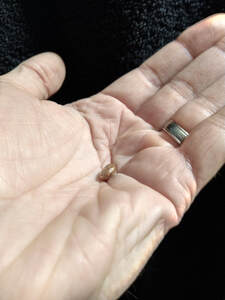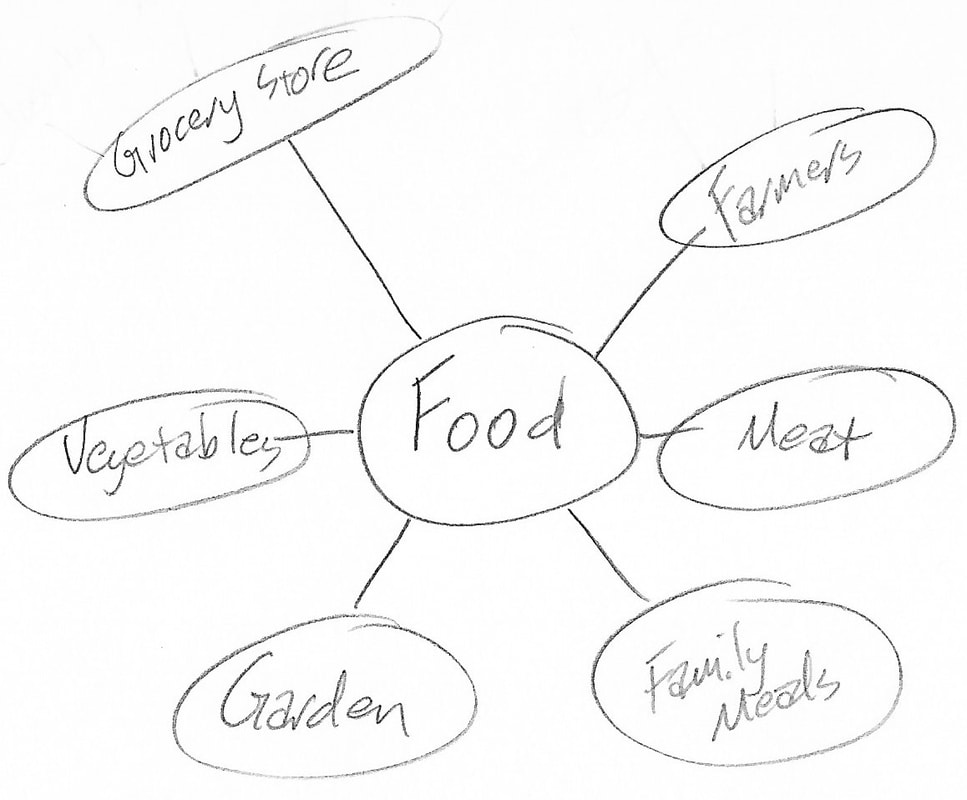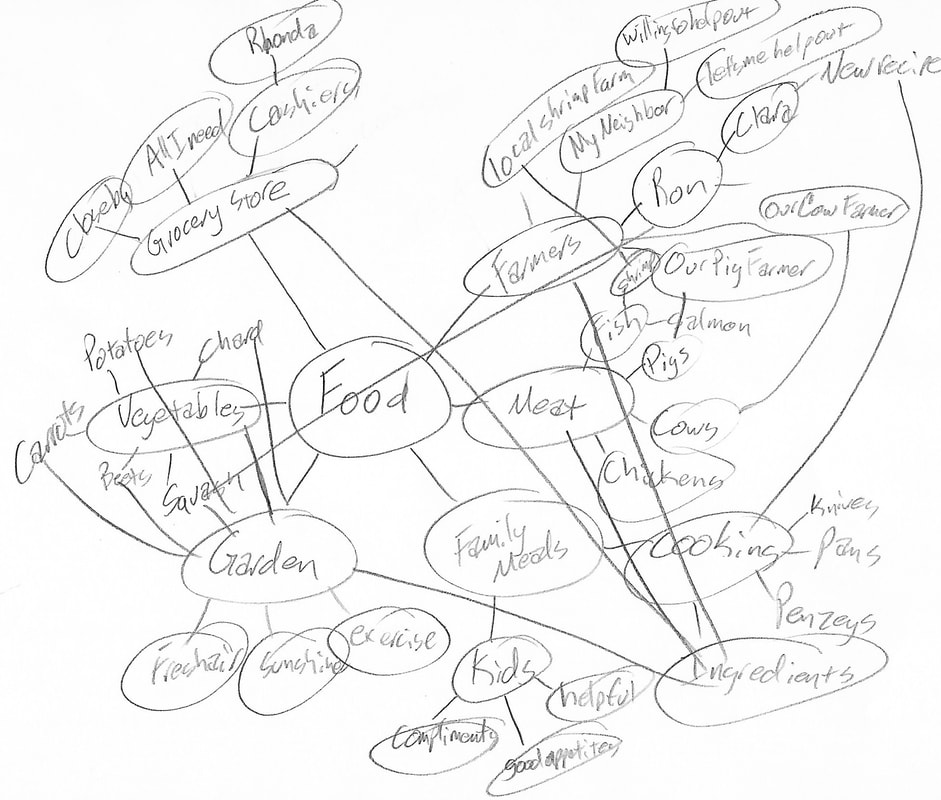 For this prayer you will need a small object that either is or can represent a seed to you. A dry bean would work well, but so would a button, a paperclip, or some other item you have handy. Matthew 13:1-9, 18-23 That same day Jesus went out of the house and sat beside the sea. Such great crowds gathered around him that he got into a boat and sat there, while the whole crowd stood on the beach. And he told them many things in parables, saying: “Listen! A sower went out to sow. And as he sowed, some seeds fell on the path, and the birds came and ate them up. Other seeds fell on rocky ground, where they did not have much soil, and they sprang up quickly, since they had no depth of soil. But when the sun rose, they were scorched; and since they had no root, they withered away. Other seeds fell among thorns, and the thorns grew up and choked them. Other seeds fell on good soil and brought forth grain, some a hundredfold, some sixty, some thirty. Let anyone with ears listen!” “Hear then the parable of the sower. When anyone hears the word of the kingdom and does not understand it, the evil one comes and snatches away what is sown in the heart; this is what was sown on the path. As for what was sown on rocky ground, this is the one who hears the word and immediately receives it with joy; yet such a person has no root, but endures only for a while, and when trouble or persecution arises on account of the word, that person immediately falls away. As for what was sown among thorns, this is the one who hears the word, but the cares of the world and the lure of wealth choke the word, and it yields nothing. But as for what was sown on good soil, this is the one who hears the word and understands it, who indeed bears fruit and yields, in one case a hundredfold, in another sixty, and in another thirty.” This Parable is often called, “The Parable of the Sower and Explanation.” As I have come to understand this parable over the years, it is not so much a parable that describes certain types of individuals in the world, that some are rocky soil and others thorns, that some are pathways, and then there are a few that are good soil. This is one interpretation, but a better one for us as disciples engaged in examining our own life is that there are times and places in every individual’s life that they are all four types of soil. To say this and then go exploring your life with that as your guiding principle will perhaps not be most comfortable exploration of your life, at least if you are being honest with yourself. It will be uncomfortable because it will bring up places where you will have considered yourself to have “failed,” However, in light of what Jesus is actually saying in the parable, to pick up those times and places in prayer, and to look at them with Jesus as our companion, it truly offers you the opportunity to examine them closely and to see where the fault really lies. Looking at these times is an opportunity to see where the fault was simply the circumstances of the world, where it was your own age and its consequential emotional, physical, and mental development, or even where it was your own distorted views of who you are and what you are capable of. Bringing these times into a conversation with Jesus can be an opportunity to put them to rest once and for all, and to be released from them. On the other hand, if you do find you are truly at fault somewhere, it is a chance to confess, to receive forgiveness, and move in new directions which is a form of freedom in and of itself. Similarly, to reflect on where God’s word has fallen on good soil in your life is an opportunity to see with clarity, how your unique giftedness contributes to God’s Kingdom in our midst and where you are bearing good fruit in this world. Let us pray: Place your seed in a hand that is held wide open and flat. This is the seed that has fallen on the paths of your life. Where Jesus says, you heard the word and did not understand it and thus the evil one came and snatched it away. With your other hand, remove the seed from your wide open hand. As you do so, bring to mind a time that you did not understand something as a message about the kingdom of God. Are you still without understanding? Has your understanding evolved? Are you beating yourself up over your lack of understanding, or are you holding a younger self who knew no better accountable for its indiscretions? Talk with Jesus about the times you have not understood, ask for his help in understanding better. Where there is fault, hear his forgiveness, where there was no fault, let go of the past, in so far as changes can be made, commit to a deeper understanding that your many paths may become fertile soil. Now, place your seed in an open hand with wide-spread fingers. This is the seed that has fallen on rocky soil. Where Jesus says it is received with joy but has no depth to sustain it. As your seed sits in this soil, bring to mind a time where you received God’s word with enthusiasm, and sprung to life but soon withered away. As you recall this time, how old were you? What were the circumstances surrounding your hearing of God’s word? What sort of support was offered and received? As you recall your response, was it really in keeping with who you have come to know yourself to be? Talk with Jesus about the times you have responded to the word but there has been no depth of soil to support its growth. Where there is fault, hear his forgiveness, where there was no fault, let go of the past, in so far as changes can be made consider the possibility of replanting that seed where you know the soil is good. Next, place the seed in a closed fist. This is the seed that has fallen in the thorns which choke out its life. Where Jesus says, the cares of the world and the lure of wealth choke the word and it yields nothing. As you clutch your seed, bring to mind a time when the word was choked in you. What were the cares of the world that came into play? How legitimate do you consider these concerns and what if anything did you truly have control over? What lured you away and what still lures you? Are there aspects of the kingdom of God that you find even more appealing than these lures? Talk with Jesus about the times God’s word has been choked in you. Where there is fault, hear his forgiveness, where there was no fault, let go of the past, in so far as changes can be made, focus on how the Kingdom of God appeals to you. Finally hold your seed lovingly in both hands. This is the seed that has fallen in good soil. Where Jesus says you have understood, and borne fruit, 100, 60, or 30 fold. As you hold your seed in the good soil of your life, bring to mind a time when you feel you were being fruitful. Who was involved in this time? What was your role? What did you most enjoy about the contribution you were making? What difference did you see yourself making? Talk with Jesus about this time that you bore so much fruit. Thank him for placing that seed in the good soil of your life and ask him for more opportunities like that one. As you prepare to close your time of prayer, put your seed somewhere you will see it for the next few days. As you do continue your conversations with Jesus as you explore where the seed of God’s word has fallen in your life. Amen
1 Comment
 Matthew 10:1-4 Then Jesus summoned his twelve disciples and gave them authority over unclean spirits, to cast them out, and to cure every disease and every sickness. These are the names of the twelve apostles: first, Simon, also known as Peter, and his brother Andrew; James son of Zebedee, and his brother John; Philip and Bartholomew; Thomas and Matthew the tax collector; James son of Alphaeus, and Thaddaeus; Simon the Cananaean, and Judas Iscariot, the one who betrayed him. As Jesus summons his disciples and sends them out (the very definition of “apostle”). They are called by name, but they are also called by how Jesus knows them. In our baptism, Jesus summons us as well and then sends us out into the world. As he does so, he gives us no less authority than he did the original apostles, and he summons us with just as much knowledge of who we are and who we will become. This prayer is an invitation to reflect on who we are in Jesus’ eyes. We do this not because he does not know who we are, but so we can know that when Jesus summons us he takes all of who we are and that he loves all of who we are. This is a prayer not meant to be prayed quickly or even repetitively as a whole. It is a prayer really meant to prime to pump for some time spent in reflection. You might choose to engage with this deeper reflection by writing down a few thoughts, or simply taking time to contemplate more deeply what is prompted within you. As you pray this prayer, pick one or two portions and mix and match what you are praying about so you begin to make new connections and then simply let the rest of it go for the day. As you pray, don’t fight what comes up that the Spirit reveals to you about who you are, the point of this prayer is that Jesus knows this about you already. Jesus in fact, loves you in this already. The whole point remember is that Jesus summons you not because he is mad or embarrassed about you and is calling you onto the carpet. Jesus is summoning you, to send you out. And he does this because of who you are, not in spite of who you are. Let us pray. As we are summoned by Jesus, he calls us by name, and he calls us by all the names we are known by: What are the names Jesus calls you by? Your given name? Your nicknames? Your pet names? Your online names? Jesus knows these names and he calls to all of them- Come to me. As we are summoned by Jesus, he calls us by whom we are related to. Who is your family of origin- your mother and father? Your siblings? Who is your family that you have chosen through the years? Jesus knows where you have come from, the good that has instilled in you and the struggles that has caused you, the joy and the pain that have both come from the people you are closest to. Jesus knows from whom you come, and calls you from them- come, have authority over unclean spirits. As we are summoned by Jesus, he calls us in what we do. What are your jobs in life? What hats do you wear? What has been a joy in your life this week? What has taken your life out of you? Jesus knows all your titles and calls you in them- come cast out unclean spirits. As we are summoned by Jesus, he calls us from where we live. Where are you from? What advantages has this given you? Where has it left you disadvantaged? What has it taught you? What do you still long to learn? Jesus knows where you are from, and calls you from there- come cure every disease and sickness. As we are summoned by Jesus, he calls us though we betray him. What are the things of your life that weigh heavily upon you in your relationship with Jesus? Jesus knows how you have betrayed him, and he calls you just as he did Judas- come, be my apostle. Amen  Beginning in Chapter 13 of the book of John, Jesus begins what is referred to in biblical scholarship as the farewell discourse. It is the last teaching that he gives to his disciples and he holds forth for four chapters worth of material. The discourse leads up to the culmination that is called Jesus’ “High Priestly Prayer” which is his final prayer for his disciples before he is betrayed, crucified, and put to death. The prayer includes a desire that the disciples be protected from evil, and that God’s name might be glorified through Jesus’ death and the disciples’ testimony. It also includes the following lines where Jesus expresses a desire that all may be “one”: 20 “I ask not only on behalf of these, but also on behalf of those who will believe in me through their word, 21 that they may all be one. As you, Father, are in me and I am in you, may they also be in us, so that the world may believe that you have sent me. 22 The glory that you have given me I have given them, so that they may be one, as we are one, 23 I in them and you in me, that they may become completely one, so that the world may know that you have sent me and have loved them even as you have loved me.” John 17:20-23 NRSV I have often heard this interpreted as Jesus expressing a desire that we as Christians might be united in purpose and that the purpose we are united in might be the purposes of God. This is not a bad interpretation, but I would like to push us a little further down into the layers of meaning that John’s Gospel contains. I would like to suggest that another possibility of what Jesus is alluding to in his use of the word “one” is that of a mystical union. We recognize that Jesus is united with God in an inseparable way; the actions, thoughts, and desires, of one, are the same as the other. Our doctrine of the Holy Trinity, the foundation of our Christian beliefs says this. So, when Jesus says he want’s us to be one, “as we are one, I in them and you in me, that they may be completely one,” his desire goes well beyond a unification of purpose, his desire is that we might be connected to him (and the rest of the Trinity) as he is connected to it. This connection means many different things, it is a mind-bending field of exploration that we can take our whole lives exploring. What I’d like to focus on in this particular prayer, is how this connection means, our pain (emotional, physical, and mental) and Christ’s pain are one and the same, and that Christ’s breath and our breath is also one and the same. We begin our prayer by settling in to where we are, getting ourselves comfortable, closing our eyes if it helps and then setting the scene in our mind of gathering with the disciples behind closed doors on the evening of Easter Sunday. We have received news earlier in the day that Jesus’ tomb was empty, and that Mary Magdalene and several of the disciples have seen Jesus alive, but there are still many unanswered questions and there is still grave danger about. As you sit in in your locked room, sit with these questions: What are you hiding from at this time? What danger is in the world? And as locks work in both ways, think of these questions as well: What are you keeping hidden from the world? What are you locking away because it feels safer? (Take a few moments for quite reflection) As you sit with these things, let it come to your attention that Jesus has entered the room. Though not invited, he comes anyway, because you are united with him, your fears are his fears, the danger you are hiding from is his danger, he is there to be with you in all you are going through. As you meet with Jesus, you notice the nail prints in his hands, they are still open wounds, they are still raw, but you are drawn to touch them. As you do, in your mystical connection to Jesus, you become aware of your own pain, and your own wounds. As you sit there with Jesus, feel the pain that you are holding, but do so knowing it is not yours alone to bear, that Jesus carries it with you, and is willing to take it from you. (Take a few moments to sit with Jesus) As you sit with Jesus, you realize that he is close enough to feel his breath on your skin. Feel Jesus breath by taking your hands and cupping them together. Then raise them to your forehead, and exhale deeply into them, your breath as his breath. As you breath out, feel the breath of Christ wash over you. As you feel Jesus’ breath, hear his words as well, “Peace be with you. Receive the Holy Spirit” (Repeat for 3 breaths) Amen The S’s were: Swaddle, Side or Stomach Position, Shush, Swing, and Suck. I’d recommend looking into this for anyone with newborn children. For us, what worked best was the Shushing, which consisted of simply making a shhhhhhhhhhhhhhhhhh sound close to the baby’s ears. The sound was meant to simulate the noise that the baby had been used to in the womb. It also served to block out other distractions, and with that comforting familiarity and other sources of stimulation blocked out, the child was soon comforted and calmed down.
It's kind of funny but this shushing almost seems to be instinctual and something we carry with us into our later life. Shushing is an almost universal lingual trait. Even in cultures with languages that don’t have a “sh” sound, people will shush each other as a means of asking for quiet or as a means of getting another to calm down. With this prayer, we’re going to bring this concept of shushing into prayer. The script will lead you through a short meditation with some pauses in it. In those pauses, you are invited to let things that might distract you from worship bubble up within you. As your distractions come to you, you’re then invited to shush them. This is not meant to be one big congregational response of shhhh it’s individual for as many or as few times as you wish or need. Here’s the thing though, as you shush whatever is coming up inside of you, the idea is not to be self-chastising about it. This is not about mastery of our minds and bodies, it’s about recognition of what is keeping us from God. We can shush in lots of different ways, and one of those ways is an impatient, irritated, harsh kind of shush. I will admit I’ve been guilty more than once of using this tone as a means of cutting people off mid-sentence. At those times the shush is a quick quip that demands compliance rather than gently asking for calmness. That is not how we are desiring to treat ourselves in this prayer nor is it how we are wanting to treat each other as we will hear each other’s shushing. The idea here, going back to the idea of shushing a child, is to calm and gently lay down those thoughts that are clamoring for your attention in this moment. Let us begin: Find a comfortable way to sit and find a comfortable way to hold your hands. Maybe lay them in your lap or let them rest on your thighs. If it helps, feel free to close your eyes. As you sit there, breathe in and out in a relaxed way neither inhaling too deeply nor forcing your breath out too far. Allow a few moments of breathing. Then continue... We come here from many places and circumstances this morning. Each of us in some way overcame obstacles to be here. Some of these obstacles may still be calling our attention. Sit for a few moments and let any struggles that you have experienced so far today rise to the surface of your thoughts. Maybe you had car trouble. Maybe your body was not cooperating as it once did. Perhaps you had an argument or other difficulty with a family member. Whatever struggles you have had, whatever obstacles you have encountered, let them rise up within you, acknowledge them and how they are keeping you from worship, let them know you will attend to them later and then lay them down to rest with a gentle, Shhhhhhhhhhhhhhh. Give time for the shushing to die down. We gather here with many things left to do in our days. Those things ask us to leave this time of worship. Sit for a few moments and let your to do list rise to the surface of your thoughts. What chores are calling to you? What homework assignment have you not yet completed? What things must you get done before the end of this day in order for tomorrow to begin well? Whatever you have left to do that is calling you away from here, let it rise up within you, acknowledge it, let it know that you will attend to it later, and then lay it down to rest with a gentle, Shhhhhhhhhhhhhhh. Give time for the shushing to die down. We gather here this morning each with things on our hearts and minds too numerous to name. People that we are worried about. Fears and doubts that plague us. Worries over circumstances and situations in the world that we have little to no control over. Take a few moments and let whatever is keeping you from God, whatever is calling your attention elsewhere rise to the surface of your thoughts. As it does, acknowledge it, let it know you will attend to it later, and then lay it down to rest with a gentle, Shhhhhhhhhhh. Give time to the shushing to die down. Lord God, throughout this worship service, continue to shush and comfort us as we need it. Fill us with your Spirit. Help us to overcome or accept those things with which we struggle. Order our days to your glory. And hear all of our worry and fear and doubt for what it is, prayers to you for help. Amen. , Intention: This prayer is good for helping to both broaden and get more specific in your prayers of thanksgiving. Materials: A sheet of paper, 8 ½ x 11 or larger A pen or pencil Backstory: I have been focusing on Prayers of Thanksgiving during the month of November. I’ve been doing this in worship with the congregations that I serve, with the classes that I teach, within my own family, and in my own prayer life. Something that I have noticed during this time is that people, myself included, tend to be thankful for very general things like food or family. For me, this has been a good place to start, but I have felt like I am often praying for the same things in a very repetitive way. In response to this repetition, I was feeling a desire to get beyond vague generalities so I could see with a little more clarity, specific things that I am thankful for. It’s good to be thankful for food and hopefully having enough of it. However, our thanks becomes transformative in our lives when we can really recognize specific blessing, offer specific thanks to God, and make closer connections with our community who supports us. For example, through a web prayer, I saw, that I am thankful for a new recipe, for squash, both of which were given to me by Ron and Clara, two farmers that I know, who raise food. Similarly, I was able to give thanks for hard work and fresh air, working in the garden, where I raise some of my own vegetables, which are food. These two things and much more came out of spending about ten minutes with a web prayer. Process: To begin your web prayer think of a general topic, something you would feel safe offering up, out loud, in a room full of people. Something like family and food that have already been suggested might be good places to start. Write your topic in the middle of your paper and circle it. Next, contemplate your chosen topic and write down words that you associate with it around the original word. Circle them and draw lines to connect them. Now, take time to contemplate these new words and repeat the process of association, writing, circling and drawing lines as many times as you wish. Notice as you pray in this way, that with each layer, you are getting more and more specific as well as discovering more and more that you have to be thankful for. Notice as well, that there may be things that come up that seem related to multiple other items. As you notice these things, feel free to draw as many lines of connection as you feel like. It may seem like it will turn into a mess, and it very well might. Know, however, that it is a Holy Mess that you are making, and it is this Holy Mess of interconnectedness that works to support and sustain you on a daily basis. Have fun with this prayer and enjoy what it reveals to you. My prayer for you is that you will revel in your blessings.
For further reflection: What surprised you the most that you are thankful for? Are there things that could have fit in multiple categories? Why do you think they came up when you were contemplating one word verses another (unconscious), or why did you consciously choose to put them in the category you did? Were there things that it was hard to be thankful for, or that you thought about but didn’t or couldn’t bring yourself to write down? Who came up in your prayer that you would like to thank in person? Variations: This prayer could easily be turned into a group prayer using a large whiteboard or post-it notes on a wall. The leader could begin with a general topic, and invite group members to say out loud or silently come up and write or place post its that they associate with that topic. Work in rounds with the group as the layers are filled out. To slow down, and engage your more creative side, calligraphy pens and techniques could be applied to the writing of the words. You could also try using doodles instead of words. Tell us how you’ve used this prayer in the comments below. |
AuthorPatrick Sipes is the founder and director of The Forming Spirit. You can learn more about him here. Archives
July 2020
Categories
All
|




 RSS Feed
RSS Feed
